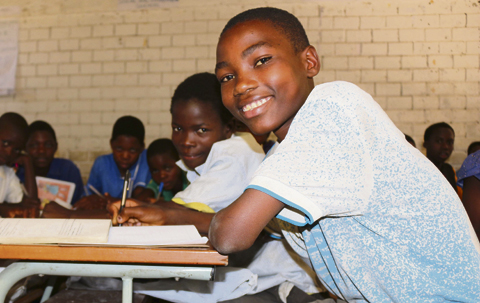May 27 | ![]() 0 COMMENTS
0 COMMENTS ![]() print
print

‘Bless Mary’s Meals for giving us some strength’
One year on from the wonderful news that Mary’s Meals is providing daily meals to more than one million children every school day, Mairead MacRae press and communications officer at Mary’s Meals, looks at the current situation in Malawi and how community-run school feeding programmes are providing a vital life-line to many hungry children
At Chirimba Primary School, Malawi, teachers, schoolchildren, Mary’s Meals staff and volunteers gather together to commemorate the fact that charity is providing more than one million children with a daily meal in their place of education every school day.
Yet, even during the celebrations of music, dance and—of course—food, it was clear that Mary’s Meals considered its work to be only just getting started. When the charity’s founder and CEO, Magnus McFarlane-Barrow, addressed the crowd at Chirimba in May last year, he noted that 59 million school-age children were still missing out on an education, stressing the importance of continuing the vital work of the Mary’s Meals movement.
A little over a month ago, the Malawian president, Peter Mutharika, declared the country to be in a state of national disaster. Since the end of 2015, Malawi has been facing its worst food crisis in a decade. Erratic climate conditions, primarily caused by an unusually strong El Niño, have resulted in a devastating combination of extreme drought and excessive rainfall—a deadly mix that is proving catastrophic for many communities.
Southern Africa is experiencing its driest rainfall season in the past 35 years. In southern Malawi, crops are withering and nine districts are suffering from a cholera outbreak, with more than 1,000 cases of the infection reported in the region since January.
In the North, heavy rains are continuing to fall, exacerbating the area’s existing flooding problem, damaging homes and crops, and forcing 35,000 people into makeshift camps. To compound Malawi’s internal displacement emergency, increasing unrest in neighbouring Mozambique has seen an influx of refugees to Malawi where food is already in high demand. In the Dzaleka refugee camp, which houses 35,000 people, food is expected to run out completely by August.
Communities are reporting cases of families—driven by acute hunger to eat whatever they can find—dying after consuming poisonous plants.
Machinga, in southern Malawi, has been bearing the brunt of this crisis and families in the region are enduring a daily battle to survive. In the village of Chilala, 40 year-old Lucy Shipa is struggling to provide for her nine children. While sitting outside her single-room mud hut, Lucy described the terrible hardship her family had been enduring for months.
“I rarely have enough food to feed the whole family,” she said. “Since my husband’s passing in 2013, I have been the sole breadwinner. Normally I work in other peoples’ fields to earn some money. But this year due to the poor harvest there is no work being offered in the fields.
“I try to find whatever is leftover in others’ fields to maybe cook something small for the children. But everyone here is fending for food the same way. Life is difficult and has been difficult for the last few months but there is no option for me, other than not losing the will for my family to survive each day.”
In areas where food is scarce and families are living hand to mouth, children often have no choice but to leave school in order to spend their days sourcing much-needed income or food for their families. Lucy’s 13-year-old-son Ndilibe Kafunse (above and bottom right with family) was forced to come out of school to help his mother look for food or to beg in town for anything passers-by could offer him.
“I was often missing school because I was too hungry to attend and needed to go looking for food,” Ndilibe said. .“You know, when you have no food in your belly you can’t concentrate. You can’t think. You just worry where the next meal is going to come from.”
However, in the midst of this crisis, a crucial lifeline is being offered to Lucy and her family. Mary’s Meals provides a nutritious meal to 814,000 children in Malawi in their place of education every school day. The charity recently began serving a daily meal of likuni phala—a vitamin enriched maize porridge—to thousands of children in 15 schools across Machinga, including Ndilibe’s. Every day, Ndilibe now attends Standard 4 classes at Chilala Primary School, safe in the knowledge that he will receive a filling meal.
This glimmer of hope offered by Mary’s Meals has had a transformative effect on Ndilibe and his family. While reflecting on his family’s recent struggle to survive, Ndilibe paused before exclaiming joyfully: “I just realized my next meal will be likuni phala. It will be you, Mary’s Meals, from where I will next get to eat!”
It costs just £12.20 to feed a child for an entire school year through Mary’s Meals. That such a small amount of money could so radically alleviate Ndilibe’s suffering—and enable him to once again benefit from an education that could be his route out of poverty—is nothing short of astonishing.
Lucy’s relief that her son is now being fed daily by Mary’s Meals is evident. She says: “He has not missed a day of school since the likuni phala began to be served. At least in some way he has some relief. Although there is nothing right now, at least my son has some food in his stomach.
“I know this is not the end, there are going to be some very difficult months ahead. I am really struggling to keep hopeful, but the likuni phala Ndilibe receives at school everyday reminds me of why I need to keep hopeful.”
Lucy’s determined hope for the future is being replicated in households across Machinga, where Mary’s Meals is providing thousands of children with what will often be their only meal of the day.
The head teacher at Chilala Primary School, William Sandram, emphasises the importance of the Mary’s Meals feeding programme at his school to giving families strength in their daily struggle against hunger. He said: “There were many children like Ndilibe who were sleeping and coming to school with nothing in their bellies. We had a 50 per cent dropout rate. But, just in the last two weeks—since the feeding began—we have seen attendance increase to 100 per cent and enrolment increase too.
“Undoubtedly, the next few months are going to be extremely tough for everyone. Without Mary’s Meals here we would’ve probably been forced to close the school.
“So, honestly I’m short of words. Hunger here is like a war amongst the people. So, bless Mary’s Meals for giving us some strength—like armour—with which to battle this hunger.”
—It costs just £12.20 to feed a child for the whole school year through Mary’s Meals. To find out more or to donate, visit www.marysmeals.org.uk or call 01838 200 605.











